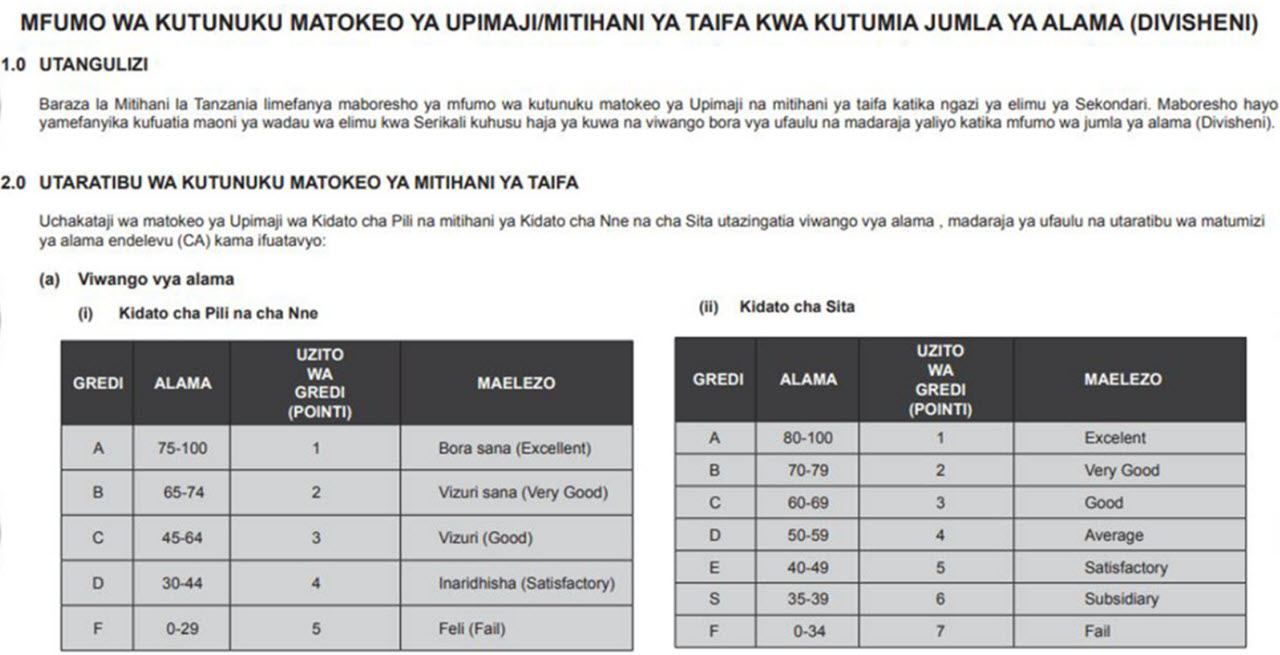A level Grading System in Tanzania
Tanzania A level Grading System 2024 Latest: In Tanzania’s A-level secondary education system, grades play a crucial role in determining a student’s eligibility to enroll in a university or college. Students are required to obtain grades ranging from A to D level in at least 2 of the 3 core subjects. Additionally, they must achieve a minimum grade of S grade. Students typically take the three core subjects and there are also options to take additional classes.
It is important to note that grading at universities is done independently and grading systems may vary between different universities. This means that specific grading requirements and standards across universities may differ, and students should be aware of the grading criteria for the particular college they are interested in attending.
Tanzania’s grading system follows specific grade boundaries where grades equal grades/Tanzania A level Grading System 2024 Latest. This means that student grades are assigned to a specific grade based on predetermined thresholds. Grade boundaries determine the range of grades required to achieve a particular grade.
This system provides clear guidelines for students, teachers and parents to understand the level of achievement based on the grades earned. It also helps maintain consistency and fairness in the evaluation process. Tanzania A level Grading System 2024 Latest/Understanding grade boundaries is essential for students as it allows them to set realistic academic goals and track their progress effectively.
Tanzania A level Grading System 2024 Latest
Below is a general guide to understanding the equivalence between marks and grades in the Tanzanian grading system/Tanzania A level Grading System 2024 Latest:
| Percentage | Grade | Description |
|---|---|---|
| 80–100 | A | Significantly above average |
| 70–79 | B | Above average |
| 60–69 | C | Average |
| 50–59 | D | Pass |
| 40–49 | E | Below average |
| 35–39 | S | Significantly below average |
| 0–34 | F | Fail |
- Grade A: Typically, marks ranging from 81% to 100% correspond to Grade A.
- Grade B: Marks falling between 61% and 80% usually translate to Grade B.
- Grade C: Marks ranging from 41% to 60% are typically categorized as Grade C.
- Grade D: Marks between 40% and below are often classified as Grade D.
In Tanzania, grading scales may differ slightly between different educational institutions and examination boards. It is worth noting that some institutions may also incorporate “+” and “-” modifiers to distinguish between grades within each category. Students are therefore advised to consult their specific institution’s grading policy for precise details on how grades align with qualifications.

Understand Grade in Tanzania
The grading systems used by countries around the world vary widely in Tanzania A level Grading System 2024 Latest, particularly in the fields of secondary education and university education. These systems are used to evaluate and evaluate student performance and often differ in terms of the scale, criteria, and methods used for grading.
In the United States, the most common grading system in secondary education is the letter grading system, where students receive grades ranging from A (excellent) to F (failing). These letter grades are often accompanied by numerical values, such as A=4.0, B=3.0, etc. In college education, the grading system may also include pros and cons to further differentiate student performance.
In the United Kingdom, the secondary education grading system often involves the use of letters such as A*, A, B, C, etc., with A* being the highest grade. In university education, the grading system may also include classifications such as First Class, Upper Second Class, Lower Second Class and Third Class.
In other countries, such as Germany, the grading system for secondary education and university education may include numerical scales, with 1 being the highest grade and 6 being the lowest. In some countries, a pass/fail system may be used instead of letter or number grades.
In general of Tanzania A level Grading System 2024 Latest, grading systems in different countries reflect their unique educational philosophies and priorities, and understanding these systems is important for both students and educators, especially in an increasingly globalized world.
Check also:








Leave a Reply